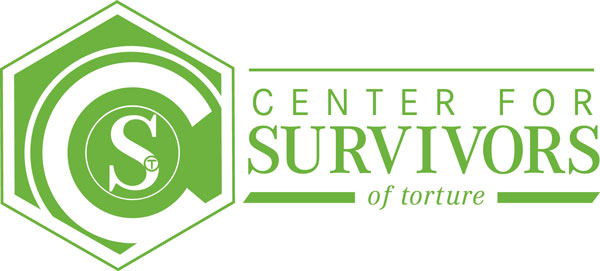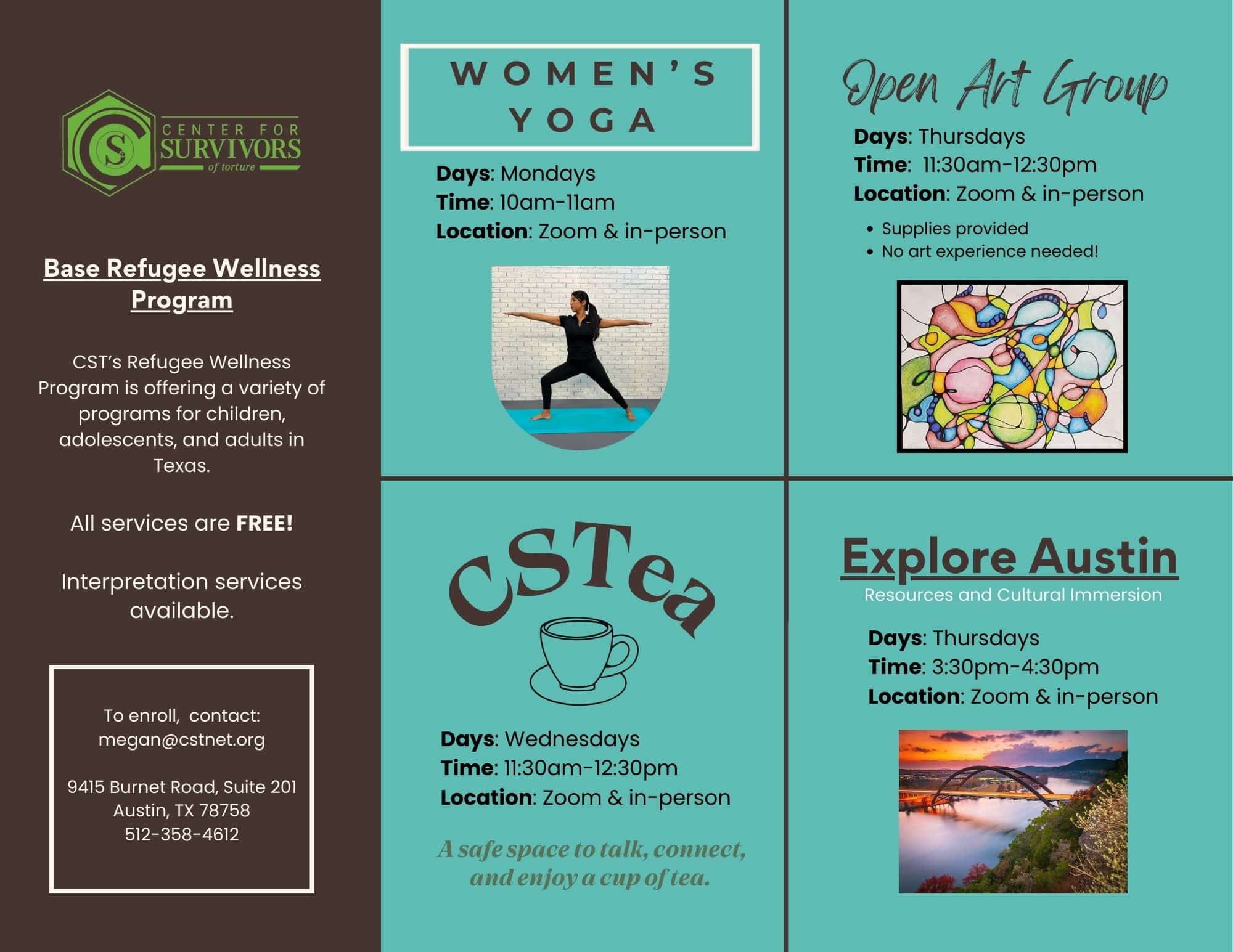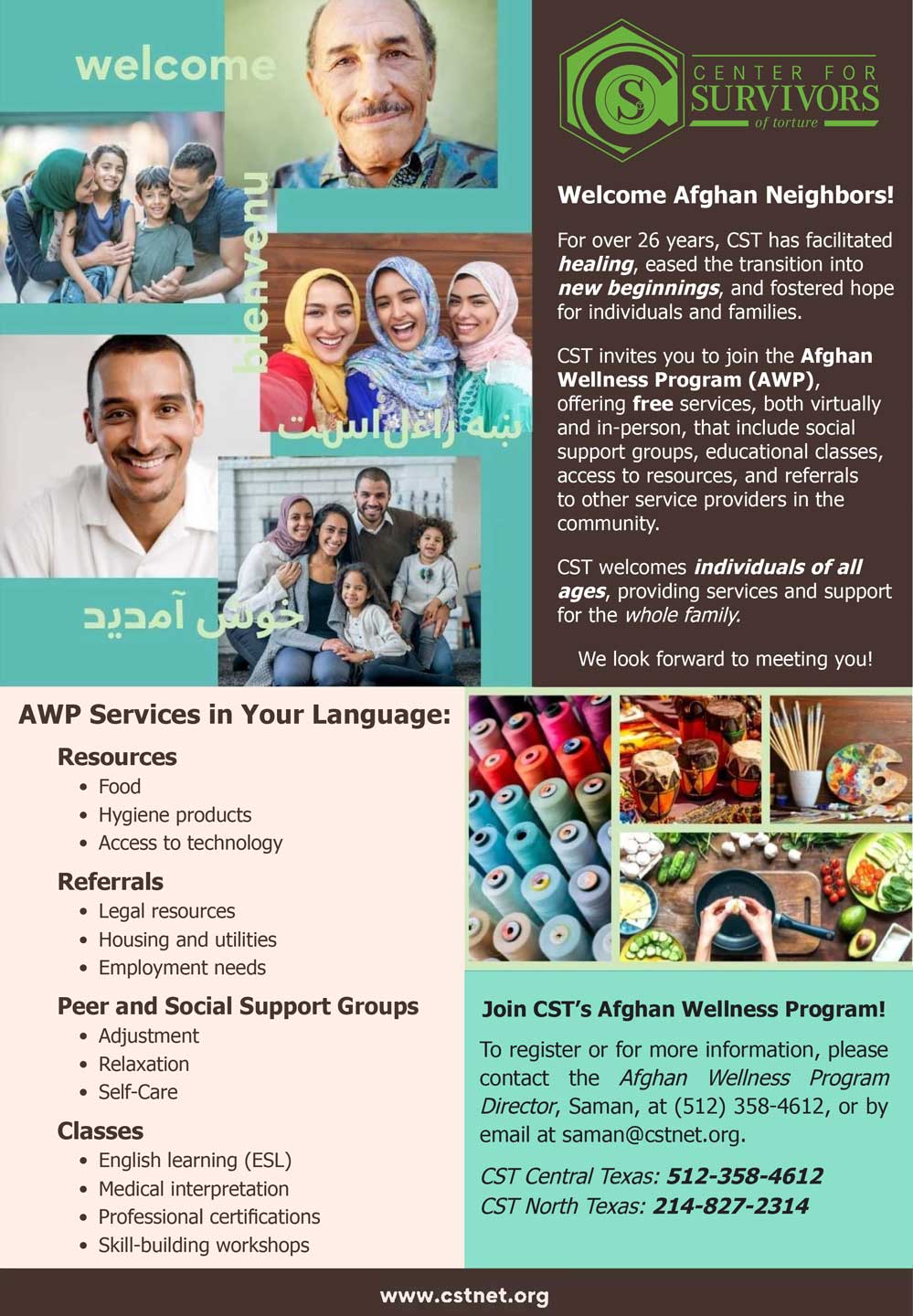Diversity is Center for Survivors of Torture's heritage and our future. Join us in being part of it.
At CST, diversity is an integral part of our history, culture, and identity. Inclusion is the way we treat and perceive all differences. We strive to create an inclusive culture where all forms of diversity are seen as real value for the organization and the community. Learn more about our mission, vision, and values here.
Survivors of torture were leaders in their home countries.
They are educators, lawyers, journalists, doctors, nurses, scientists, engineers and others who worked for positive change. They are resilient and driven to succeed; they merely need help overcoming the after effects of torture.
Center For Survivors of Torture has been supporting survivors in Texas since 1997.
How to Help
Info For Clients
Careers & Resources
Our Vision and Mission
Center for Survivors of Torture provides culturally competent services that foster hope, health, and healing.
Watch the video to learn more.
Latest Programs
Base Refugee Wellness
Click the e-flyer to enlarge
CST’s Refugee Wellness Program is offering a variety of programs for children, adolescents, and adults in Texas.
All services are FREE!
Interpretation services available.
To enroll, contact Megan Sissom, LMSW at [email protected]
Afghan Survivors Impacted by Combat
Click the e-flyer to enlarge
Center for Survivors of Torture’s new “Afghan Survivors Impacted by Combat Program” is designed to help eligible Afghans overcome severe, pervasive, and long-lasting combat-related trauma and facilitate their achievement of sustained physical, social, emotional, and economic goals and well-being. CST provides access to and engagement with effective, holistic, strengths-based, and trauma-informed services, including medical, psychological, and social work services. The program is funded by the Office of Refugee Resettlement.
Contact Joseph Reis, Clinical Case Manager, to set up an appointment. [email protected]

What is Torture and Where Does it Exist?
Torture is a violent means of controlling, silencing, and intimidating individuals and societies. There is an urgent need for psychological and physical rehabilitation for torture survivors, given the fact that over two-thirds of the countries of the world actively or tacitly endorse torture as a means of political control.
CST’s mission and goal is to facilitate healing, ease transitions, and facilitate hope in survivors of torture and trauma.
What We Do
CST provides wraparound services, which have been a best practice for many decades, and treat the whole client in the context of being an individual, a member of a family, a part of a culture and a survivor of repeated trauma, in a culturally competent manner.
Counseling
Evaluation, diagnosis and treatment with individual, group and family therapy: Trauma-Focused Cognitive Behavioral Therapy and Solution-Focused approaches
Forensic Reports
Clinical evidence
Medical care
Diagnosis, treatment, pain reduction, wound care, physiotherapy, prescriptions
Training
Training those who are interested in providing services to survivors
Social Services
Clients along with their case managers, set and achieve goals, obtain basic needs, ESL, and housing stability, leading to self sufficiency
APB Education Program
Employment skills inventory and community college easy-entry programs
How Your Donation Helps
While our clients have often endured the unimaginable, we are constantly amazed by the capacity of the human spirit to heal, forgive, and seek happiness. Your gift can help them on their journey.
Click here to read former Board Chair Paige Gibson’s “Why I Still Give to CST” letter.
- Gifts a Survivor a warm blanket for the winter
- Gifts 1 week of groceries to a Survivor
- Gifts a Survivor a Chromebook for education
- Gifts 3 months of emergency housing assistance
How Your Donation Helps
While our clients have often endured the unimaginable, we are constantly amazed by the capacity of the human spirit to heal, forgive, and seek happiness. Your gift can help them on their journey.
Click here to read former Board Chair Paige Gibson’s “Why I Still Give to CST” letter.
- Gifts a Survivor a warm blanket for the winter
- Gifts 1 week of groceries to a Survivor
- Gifts a Survivor a Chromebook for education
- Gifts 3 months of emergency housing assistance
FY 2023, CST served 850 clients and their families in Texas, ages 4-75 from 38 countries and 40 ethnicities.
Videos
Watch some of our latest videos below, and subscibe to follow CST on YouTube.
Outcomes
CST treatment is extremely effective. From impact assessment, 82% of clients meet their counseling goals within six months. They resolve grief and trauma and integrate their experiences into the larger context of their full potential.
In a one-year period, we expect to achieve:
%
of individuals will meet their counseling goals within six months—they will be able to eat, sleep without nightmares, concentrate and feel joy again
%
of children will demonstrate a reduction of symptoms as evidenced on the Children’s Depression Inventory 2 after 6 months or less of counseling
%
of clients who need medical care and medications will receive it from CST and/or referrals to other providers
%
of clients reported improved mental and physical health and quality of life through our goal-oriented services
How Many Survivors of Torture are there in the United States?
A meta-analysis of previous research studies on torture prevalence rates within refugee populations in the United States revealed that as many as 44% of refugees are either primary or secondary survivors of torture.¹ Applying the 44% torture prevalence rate to the overall number of refugees who have been resettled in the past 30 years, there could be as many as 1.3 million survivors of torture in the United States and 90,000 in Texas.
1 Center for Victims of Torture, “Updating the Estimate of Refugees Resettled in the United States who have Suffered Torture,” (Sept. 2015). http://www.cvt.org/sites/cvt.org/files/SurvivorNumberMetaAnalysis_Sept2015_0.pdf
Longer-term Program Impact and Successes
Nearly twenty-seven years ago, Congress passed the first Torture Victims Relief Act (PL 105–320—OCT. 30, 1998) with strong bipartisan support, recognizing impact of torture commonly leads survivors to demonstrate symptoms such as chronic pain, sleep disorders, severe depression and anxiety, deterioration of physical health and suicidal ideation. Today, thousands of torture survivors around the world depend on this lifesaving assistance, even though needs continue to far exceed available resources.
Longer-term program success for clients and the community includes improved mental health and quality of life, wellness, self-sufficiency, English proficiency, educational achievement, employment, economic status, support systems, civic involvement, general health status, housing, relationships, and impact on future generations.
%
of clients became proficient in English
%
of clients reported having an established support network
%
of clients were able to implement skills learned at CST in other settings
%
of clients reported improved mental and physical health and quality of life through our goal-oriented services
Twenty-nine Percent of CST’s Clients are Children
Their needs are immense and unique. The horrors endured by refugee children mandate that counseling begin as soon as possible. CST program goals are to help children process the trauma, heal physically and emotionally, improve family relationships, acculturate and become ready for formal education in public schools. CST achieves these goals through a well-designed program of counseling in schools, other agencies and in our office, medical care, education, and case management.
Success Stories
With my counselor’s assistance, each day I put my life back together…
Thank you CST Family for resources to rebuild my strength. Though this journey is long, I am not alone.
There are many blessings in this new life, and we are grateful. In the new year, I look forward to two joys: I will become a grandfather in June when my son and his wife have twins; I was just approved for the community garden. Finally, I will put my hands back to the earth.
CST is starting a program for Afghan women where I can make friends, take classes, and bring the children. Soon I will start Sewing Group. I am thankful for a place like CST.


